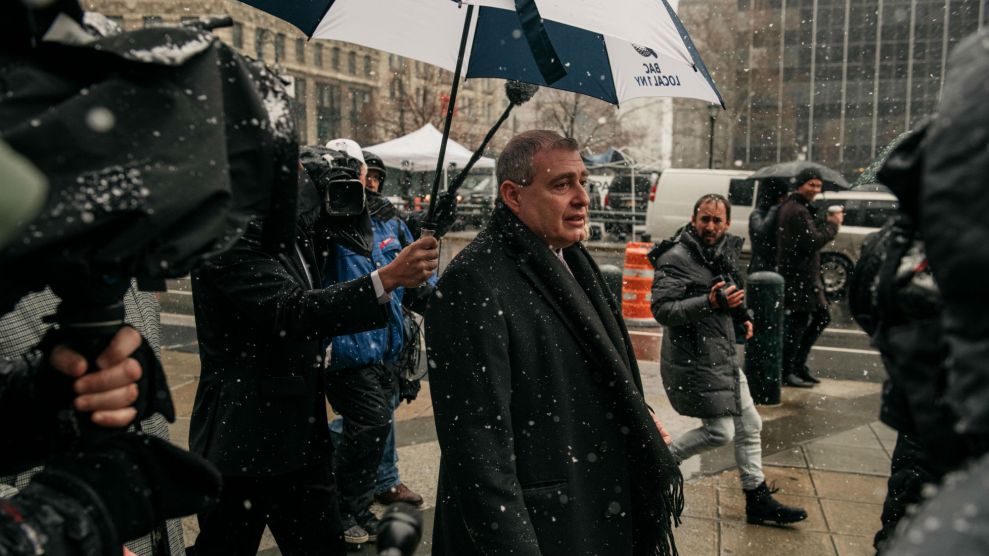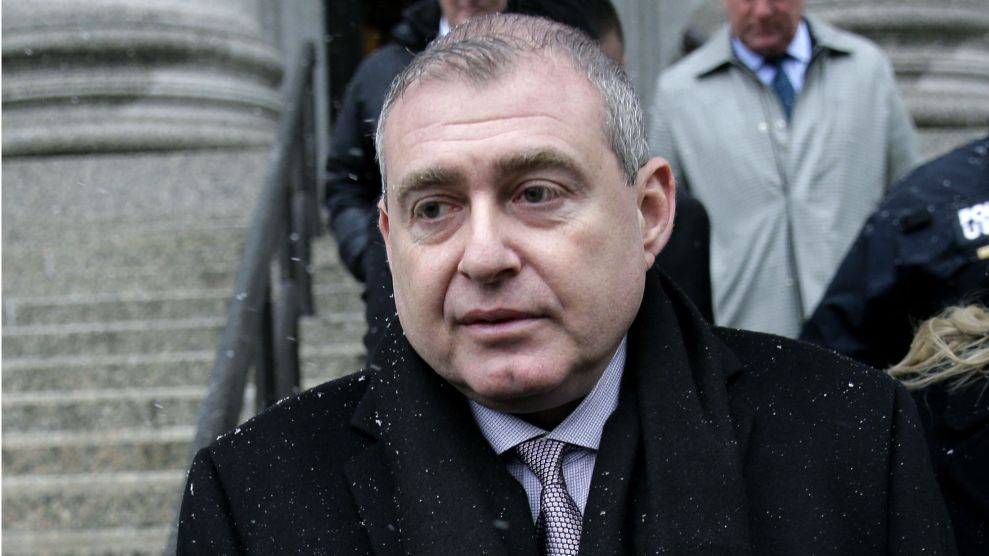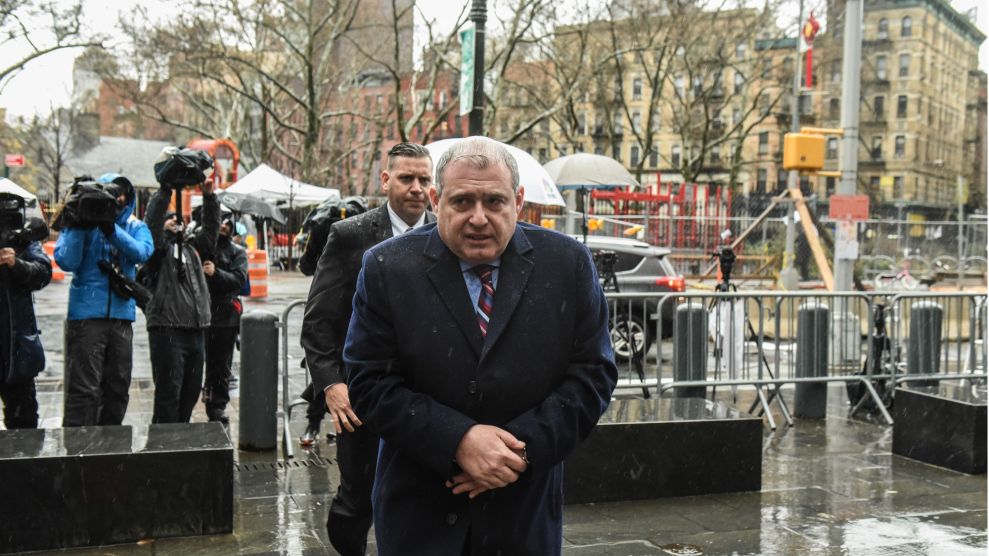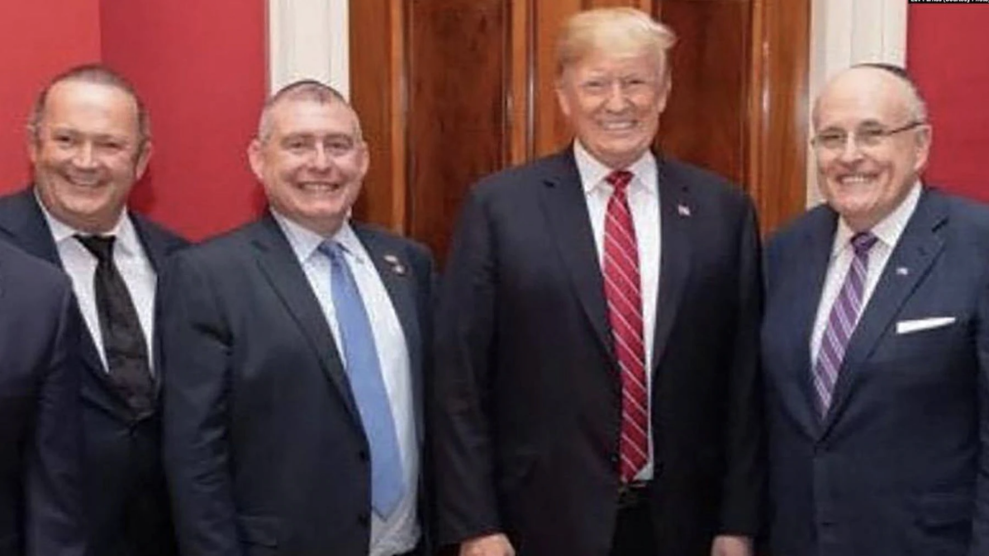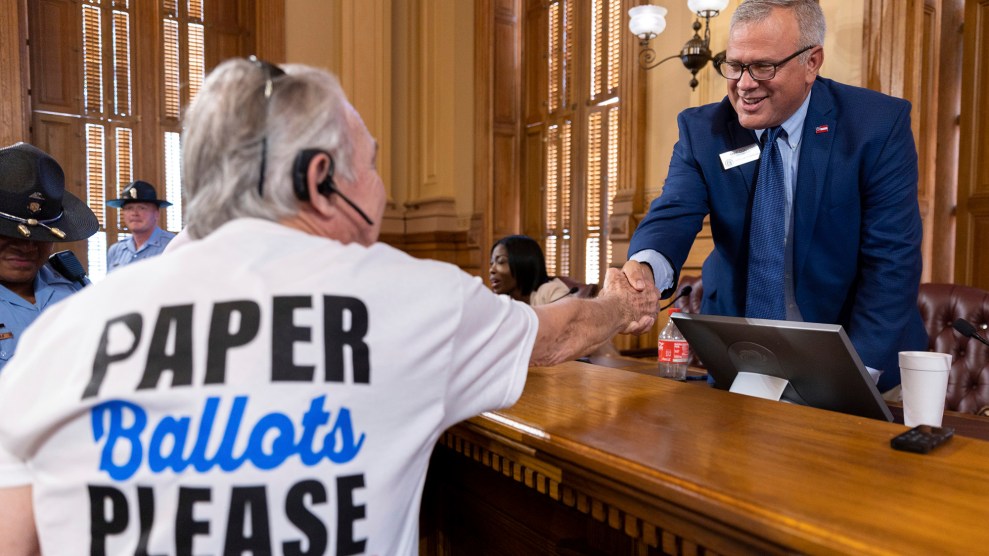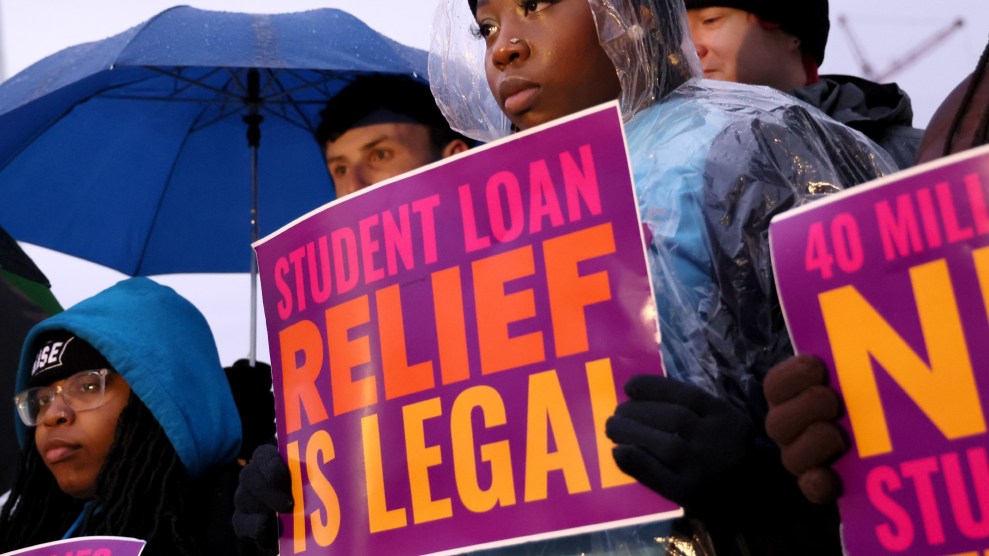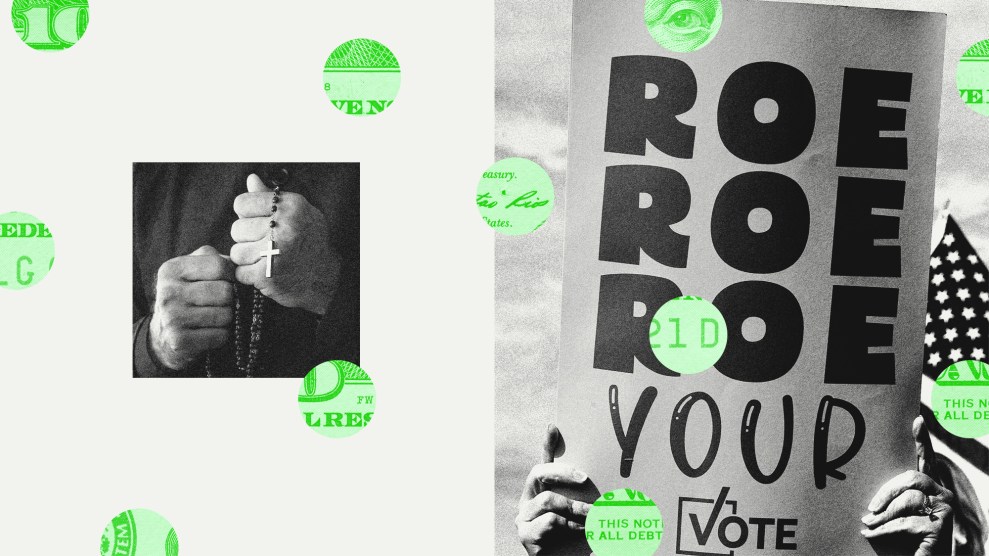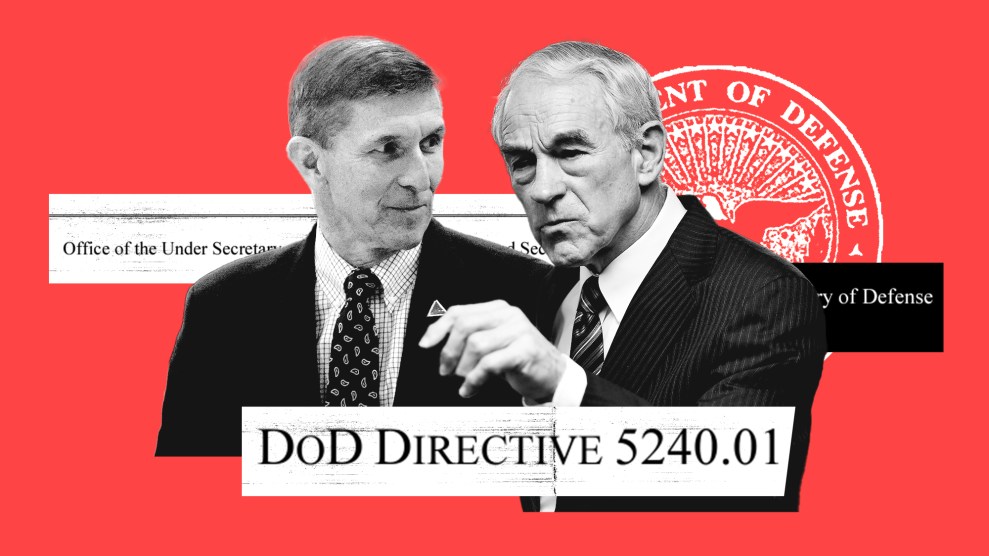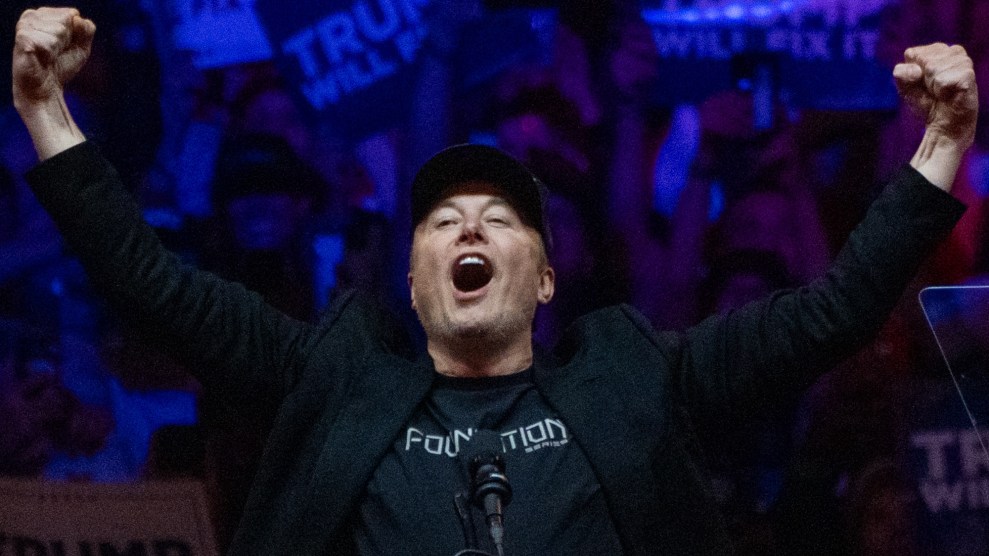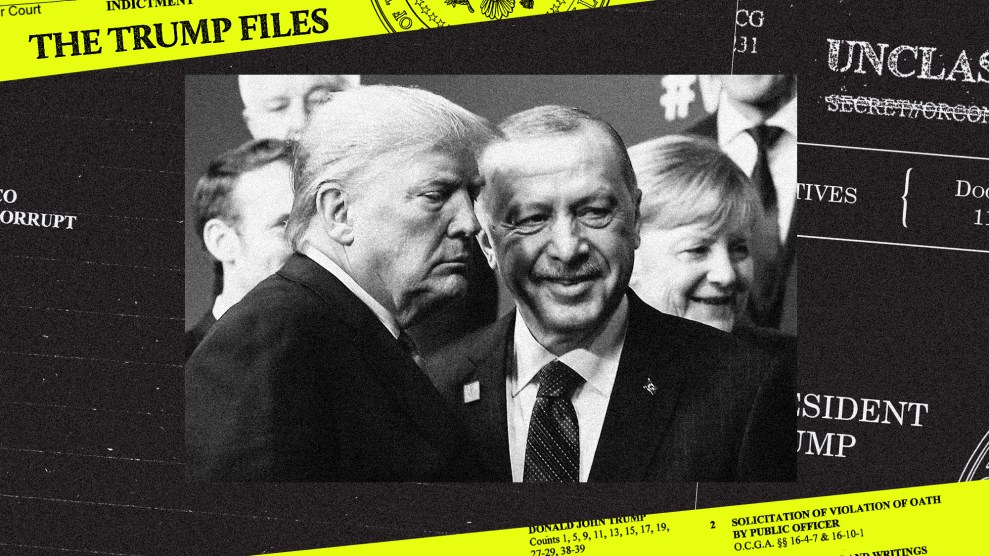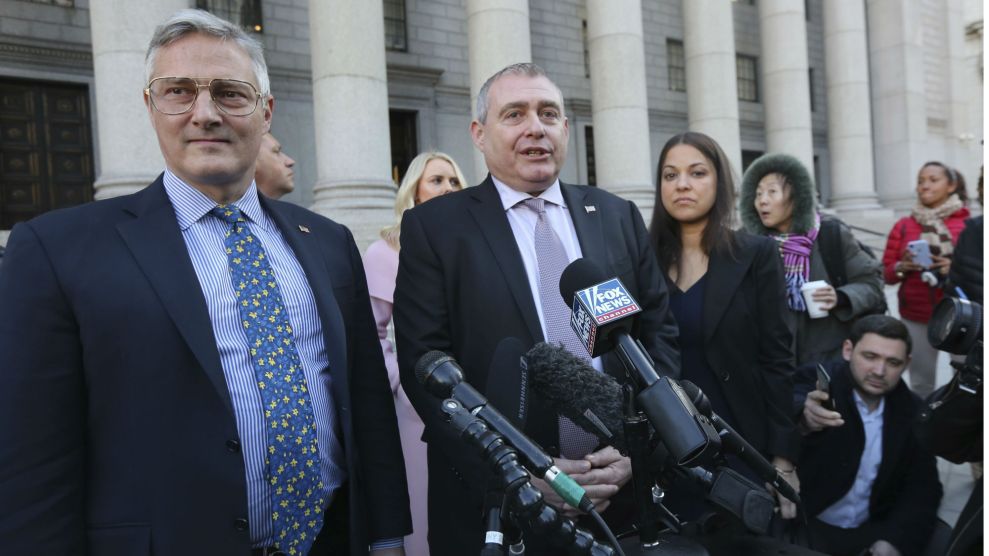
Lev Parnas, center, and his attorney, Joseph Bondy, left, speak outside federal court in New York.Mariela Lombard/AP
Last month, Lanny Davis placed a call to Joseph Bondy. Bondy’s legal client, Lev Parnas, had just appeared on the Rachel Maddow Show, and Davis was calling to dispute a claim that Parnas had made about him. But the topic of conversation soon shifted, and Davis offered some advice.
“I said to Bondy, ‘You made the right decision,'” Davis recalls, referring to the cable news appearances in which Parnas—who was indicted on campaign finance charges last year—alleged that President Donald Trump was fully aware of Parnas’ efforts to help Rudy Giuliani dig up dirt on Joe Biden.
Davis was speaking from experience. Beginning in 2018, he represented Michael Cohen, the Trump fixer and personal attorney now serving a three-year prison sentence after pleading guilty to tax fraud and campaign finance charges. Like Parnas, Cohen was prosecuted by the US attorney’s office for the Southern District of New York. And like Parnas, Cohen eventually abandoned his dogged loyalty to Trump, publicly denouncing the president’s misdeeds while offering to assist investigators.
According to Davis, Bondy said during their phone call that he admired Davis’ handling of Cohen’s case and “learned a lot” from it. Asked about the conversation, Bondy said in an email that he had actually “watched very little of the Cohen matter,” and he sought to draw distinctions between the two cases. He noted that Parnas offered to cooperate with prosecutors far more quickly than Cohen had. “I also believe our legal defense and PR efforts to be very different,” Bondy said. “Lev Parnas is certainly no Michael Cohen.” Regardless, Parnas is now attempting, as Cohen did before him, to use damaging disclosures about Trump and his allies to salvage his own reputation and, perhaps, to gain a measure of legal protection.
To this task, Parnas brings an apparent aptitude. He seems good at getting people to trust him—even when they should perhaps know better. In 2011, a Florida couple, Dianne and Michael Pues, sued Parnas for stiffing them on a $350,000 loan he claimed was for a movie deal. “He conned us from day one,” Dianne Pues told the Tampa Bay Times last year. Parnas also won the companionship of Giuliani, who now says Parnas “misled” him. And he convinced wealthy businessmen around the world to finance travel activities and, allegedly, political contributions that gave him direct access to top Republican officials.
Now, having broken with his former patrons in the GOP, Parnas has turned his charms on the anti-Trump resistance. In TV appearances, in press conferences, and even in remarks as he walked to the Capitol building during Trump’s impeachment trial, Parnas has lobbed an array of accusations at the president and his top confidantes. He’s shared documents with various publications and turned over troves of messages to House Democrats.
Some of Parnas’ allegations are backed by evidence. An iPhone recording of a 2018 dinner with Trump at the president’s hotel, for instance, suggests that Trump lied when he claimed not to know Parnas. Other explosive charges remain unsubstantiated, such as Parnas’ claims that Vice President Mike Pence, Attorney General William Barr, Secretary of State Mike Pompeo, former Energy Secretary Rick Perry, former national security adviser John Bolton, and Sen. Lindsey Graham (R-S.C.) were aware of Parnas’ efforts to dig up phony material on Biden.
Parnas and Bondy are betting that Parnas’ new status as a sort of celebrity exposer of presidential malfeasance will help him as he prepares for his upcoming trial and fends off attacks by Trump and his minions. Parnas, that is, hopes attention from Rachel Maddow fans will redound to his benefit. This is a risky legal strategy. And it ought to invoke profound skepticism.
Bondy has coined a hashtag, “LetLevSpeak,” in an effort to pressure members of Congress to allow Parnas to share what Bondy has described as “his truth.” But Parnas has already done plenty of speaking, and he leaves a lot out. He has stayed silent about the source of funds he used to for the massive campaign donations that won him access to powerful GOP politicians. He has yet to reveal the identity of a Russian businessman prosecutors say financed his efforts persuade Nevada legislators to alter marijuana laws. Neither Parnas nor Bondy have answered Mother Jones’ questions about those subjects.
Prosecutors have also said that Parnas misled them about a host of matters, including his alleged efforts to secretly advance the interests of “at least one Ukrainian government official”— reportedly Yuriy Lutsenko, the country’s former chief prosecutor—by smearing former US ambassador to Ukraine Marie Yovanovitch. Parnas denies acting as an agent for Lutsenko or other Ukrainian officials. (Lustenko, whose claims about the Ukraine scandal have shifted wildly, has also denied that he tried to cause Yovanovitch’s removal.)
In December, prosecutors sought unsuccessfully to have Parnas’ bail revoked over his alleged concealment of a $1 million transfer that a lawyer for Ukrainian oligarch Dmytro Firtash sent last year to an account in Parnas’ wife’s name. Parnas claimed the money was a loan and denied misleading investigators about it. Prosecutors have also accused Parnas of refusing to share his passwords for electronic devices seized by law enforcement, thereby slowing down the investigation.
Government lawyers have said they are likely to bring additional charges against Parnas and Igor Fruman, another Giuliani associate who allegedly conspired with Parnas in the campaign finance scheme. While Bondy asserts he is prepared to go to trial, chances remain good that Parnas will eventually plead guilty and seek leniency in exchange for cooperation, perhaps by helping investigators look into Giuliani’s activity in Ukraine. But SDNY prosecutors are known to dislike dealing with publicity-seeking defendants. Given these factors, Parnas’ PR offensive—including his public disclosure of information about Giuliani—has drawn confusion and criticism from other defense attorneys. He appears to be giving away whatever leverage he might have to bargain for a good deal—and likely pissing off the US attorney’s office to boot.
“I wouldn’t even attempt to explain what Mr. Bondy is doing,” said one attorney involved in the case.
“It’s inexplicable,” said John Dowd, a former lawyer for Trump who represents Fruman and briefly represented Parnas before Bondy took over. (Parnas claimed that he replaced Dowd because Dowd had pressured him to take a fall to protect Trump. Dowd denies this.)
Bondy says he has a plan. He told Mother Jones in November that he hoped lawmakers would grant Parnas immunity for statements he makes in potential congressional testimony. “I’d like to be able to arrive at some sort of understanding that is good for the republic,” Bondy said. But that looks unlikely. Despite Bondy’s publicity tour, House Democrats have so far shown little interest in Parnas’ stated wish to appear publicly before them. Parnas was not even among the impeachment witnesses Senate Democrats unsuccessfully pushed Republicans to call. Congress has the power to grant witnesses limited immunity, meaning that prosecutors would be unable to use information from that congressional testimony in court. But Congress would normally consult with the Justice Department on such a deal, and there’s little prospect the DOJ would want to complicate its case against Parnas by agreeing to that. Lawmakers, too, are hesitant to deploy this power—a federal judge famously threw out the conviction of Reagan aide Oliver North in the Iran Contra scandal, due to Congress’ decision to grant him immunity.
Bondy has said that, if Parnas is eventually convicted, he hopes his client will receive credit for the cooperation he has already given the House Intelligence Committee by turning over text messages and other records. “A reduction in the sentencing guidelines is possible from assisting with a congressional inquiry,” Bondy told Politico last month.
Bondy also appears to have a broader public relations plan. He has kept Parnas in the news by distributing material to select media outlets. Trump’s acquittal in the Senate may mean that Parnas’ ability to attract media attention—as well as the value of that attention—will soon decline. But Bondy remains optimistic. He has repeatedly teased Parnas’ retention of a large stash of newsworthy material. “Over the past several months, it has been revealed that Lev Parnas is a prolific collector of photos and videos,” Bondy told CNN recently. “Contrary to what one might expect, Mr. Parnas has not destroyed any. Rather, he has preserved them. The universe of subject matter is yet to be publicly revealed but is of interest in matters well beyond the impeachment inquiry.”
Bondy and Parnas’ leaks have indeed covered topics that go well beyond Ukraine. CNN reported this month on photographs provided by Bondy that showed Parnas and Giuliani in Spain with a Venezuelan man, Alejandro Betancourt, who hired Giuliani in connection with a sprawling money laundering investigation. Betancourt has not been charged in the case. Parnas’ recording of his dinner at Trump’s hotel indicated that Trump had misled the public about his relationship with Parnas. But it also revealed major donors using their access to lobby the president on a wide range of policies affecting their industries.
Bondy’s efforts, while unconventional, are hardly unprecedented. His brash, cable news-ready approach invokes Michael Avenatti, who parlayed representation of porn star Stormy Daniels into resistance hero status. (Bondy appeared alongside Parnas on CNN and MSNBC, but said little.) Avenatti even floated a White House bid, which collapsed when he was indicted for attempting to extort payments from Nike and for fraud and identity theft for allegedly stealing about $300,000 from Daniels. Avenatti was convicted in the Nike case on Friday. He has pleaded not guilty to the other charges.
But Bondy’s Parnas strategy seems even more similar to the course Davis helped to chart for Cohen, who delivered high-profile testimony against Trump before the House Oversight Committee less than a year ago. Cohen hurled a laundry list of allegations, while claiming to “regret all the help and support” he had given the real estate mogul-turn-president since joining the Trump Organization in 2007. “I am ashamed that I chose to take part in concealing Mr. Trump’s illicit acts rather than listening to my own conscience.” Cohen said. “I am ashamed because I know what Mr. Trump is. He is a racist. He is a conman. He is a cheat.”
Cohen has a GoFundMe account, which says it has raised $217,000 to help him and his family “as he goes forward on his journey to tell the truth about Donald Trump.” And since his testimony, Cohen has repeatedly touted his assistance to congressional Democrats investigating Trump while asking them to intervene in his criminal case.
So far, it hasn’t worked. Cohen, who was disbarred last year, is serving out his full-term and is likely worse off due to his failure to secure a formal cooperation deal with prosecutors, as other former Trump aides did. Davis argues that Cohen was treated harshly because SNDY prosecutors were angered when Cohen publicized evidence of Trump’s involvement in a 2016 hush money payoff to Daniels. Davis says this move was necessary to defend Cohen against Trump’s smears, but it didn’t keep Cohen out jail. That’s one more piece of advice that Davis has for Bondy: Media attention may help improve Parnas’ “credibility [and] his reputation, but it doesn’t help him get a deal with prosecutors,” Davis told Mother Jones.
Bondy counters that his client has a stronger bargaining position than Cohen did and has been more forthcoming with investigators. “He possesses a strong defense to the charges for which he is under indictment,” Bondy told Mother Jones. “His information is of far greater significance, and involves a variety of individuals.”
With Parnas set to go on trial in October, he may soon find out if that’s enough to keep him out of prison.

